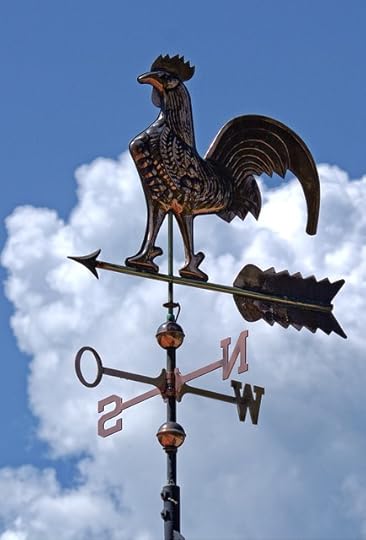Kris Spisak's Blog, page 34
October 4, 2016
Writing Tip 189: “Coral” vs. “Corral”


Psst. This is the place you’re looking for.
If you want to go dive in a corral reef, I wonder if you’ve drank a bit too much tarantula juice after a long day lassoing cows and singing cowboy songs. Don’t dive in the corral. It’ll probably hurt, and there might just be a bull in there that will add to the misadventure.
“Corrals” go with cowboys. Cowboys are often in groups (plural), so the “R”s are too.
Remember:
A “corral” is a gathering pen for horses, cows, or similar animals. It can also be a verb meaning to gather or to seize.
“Coral,” on the other hand, is that lovely reef you’re looking for. They’re pretty rare, so maybe that’s why there’s only one “R” in there. “Coral” is also maybe the shade your face turns when you mix up these two words—a redish, pinkish, yellowish hue.
I caught this “coral” vs. “corral” typo the other day, and it made me smile. You know what else makes me smile? Tarantula juice. No, not the drinking of it—though that would surely also make me smile—but the fact that this cowboy slang for whiskey exists.
Maybe we can consider that Writing Tip 189.1
The post Writing Tip 189: “Coral” vs. “Corral” appeared first on Kris Spisak.
September 27, 2016
Writing Tip 188: “Mettle” vs. “Meddle” vs. “Metal” vs. “Medal”


I wouldn’t want to meddle when this metal chicken appeared in my neighbor’s yard. Maybe they earned it somehow in lieu of a metal?
Tough times can show your true mettle, but perhaps if you were a former Olympian, tough times might make you pull out your medal, which is made of metal. I won’t ask you too much about that though, because I don’t want to meddle.
Yes, I could see how these four words could be confusing at first glance. Some mistakes between them might be typos, but often, I believe, it’s an ignorance of the word “mettle.”
Showing your strength and fortitude isn’t showing your metal, even though I could see why some logic might take you there.
“Mettle” means to have a strong character, to be courageous, or to have an even temperament.
“Metal” is a hard substance that your chemistry teacher, a geologist, or an electrician could probably tell you all about. If you’re into hair bands, you might know of another kind of metal (music).
A “medal” is an award for achievement or bravery that is often made of metal.
To “meddle” means to put your nose in someone else’s business.
Should you get a medal for knowing these differences? Maybe not, but you should feel pretty good about yourself anyway.
The post Writing Tip 188: “Mettle” vs. “Meddle” vs. “Metal” vs. “Medal” appeared first on Kris Spisak.
September 20, 2016
Writing Tip 187: “Vane” vs. “Vein” vs. “Vain”


This chicken is so vane.
Carly Simon sang, “You’re so ___.” Fill in the blank.
It’s a test of your music savvy and of your spelling.
Yes, we’re looking for the word “vain” in this instance. How’d you do?
Of course you know that:
“Vain” means to be conceited or self-absorbed;
a “vane” is something that might be on top of your barn showing the direction of the wind; and
a “vein” is a part of your circulatory system that carries blood through your body.
We could get into the difference between “veins” and “arteries,” but that’s an entirely different conversation—and it’s an answer I always forget.
Keep your vanity intact, and don’t make this mistake anymore. Got it, writers?
The post Writing Tip 187: “Vane” vs. “Vein” vs. “Vain” appeared first on Kris Spisak.
September 13, 2016
The Story of a Writing Tips Book (& a Title Announcement!)

 If you haven’t heard me screaming it from the rooftops lately, I have some news. But I’m a writer, so let me set the scene.
If you haven’t heard me screaming it from the rooftops lately, I have some news. But I’m a writer, so let me set the scene.
In the summer of 2012, I wanted to rethink the blog I had been dabbling with on my website, and after some experimentation on social media, my “Wednesday Writing Tips” began with a discussion of the differences between “farther” and “further” as well as a shout-out to the James River Writers Conference that was about to happen that year.
If anyone has ever told you that blogging is a waste of time for a writer, I’m here to prove you wrong.
In 2015, after three years of weekly blogging and a few posts that made it to the top of Google’s search results, I was finally convinced to gather my top 100 tips in an ebook and to self-publish. As a bit of a marketing experiment, I did it, and Alright? Not All Right: 100 Writing Tips for the Curious or Confused was born. A few months after its August launch, I had an offer of a buy-out from a top-tier dictionary website, but the terms weren’t quite right. Only then did I realize that I had something here.
If anyone has ever told you that self-publishing is “lesser” or cannot further your career, don’t believe them. When you take the time to do it right, it can have its rewards.
Amid work (and pitches to agents) on my fiction, I began a conversation about my blog and my concept for a larger sourcebook with the ever-brilliant and savvy Lisa Hagan of Lisa Hagan Literary. Sure, “began a conversation” is another way to say “queried” and “crafted a proposal for,” but you get the idea.
In August of this year, not only did I sign Lisa Hagan as my non-fiction literary agent, but a week and a half after that, she helped me sell my book to Career Press.
This writing business is hard. Hard. It feels like it beats you up sometimes, and being beaten up by blinking cursors and Times New Roman just isn’t any fun.
But if anyone has ever laughed at you for your dream of publishing, the best way to answer is simply to prove them wrong.
Now, I’m scribbling ferociously to finish my manuscript, loving every second of writing about possessive apostrophes and “less” versus “fewer,” and I’m thrilled to announce a title.
Get a Grip on Your Grammar:
250 Writing and Editing Reminders for the Curious or Confused
The Twitter Generation needs a writing sourcebook that’s more their style, and in mid-2017, they’ll have it.
Now, if you’re curious and start poking around my blog, you’ll probably notice a few changes. Most obviously, over 100 of my past writing tips are no longer there. They’ve been tucked away for safe keeping, and they’ll reappear in a new and expanded form in the book. In a book. My book. Excuse me, but I really like saying that.
Thanks for all of the support over the years. I cannot say how much I appreciate it!
More updates are surely to come. Happy writing, everyone!
The post The Story of a Writing Tips Book (& a Title Announcement!) appeared first on Kris Spisak.
September 6, 2016
Writing Tip 186: “Kernel” vs. “Colonel”

 I have a feeling there are some authorities in the world who might be less than happy with this mistake. When I caught it a few weeks ago, I gave the writer the benefit of the doubt that they took a stab at spelling “Colonel” the correct way and autocorrect was to blame for turning military personnel into a dried seed ready for popping popcorn.
I have a feeling there are some authorities in the world who might be less than happy with this mistake. When I caught it a few weeks ago, I gave the writer the benefit of the doubt that they took a stab at spelling “Colonel” the correct way and autocorrect was to blame for turning military personnel into a dried seed ready for popping popcorn.
Remember, folks:
A “colonel” is an officer of high rank. In the U.S. Army, a colonel is above a lieutenant colonel and below a brigadier general .
A “kernel” is the interior part of a seed, nut, or similar, which is often edible. If not enclosed by a hard shell, it can also be within a husk. A secondary definition of “kernel” refers to that metaphorical nugget that is most important, for example a “kernel of truth.”
Some kernels are better with salt and a little bit of butter. Colonels, on the other hand, are not.
Don’t let spellcheck fool you into making hilarious mistakes, folks!
The post Writing Tip 186: “Kernel” vs. “Colonel” appeared first on Kris Spisak.
August 23, 2016
Writing Tip 185: “Down the Pike” vs. “Down the Pipe”


On Pike’s Peak, this dog might be wondering what’s down the pike and perhaps if it’s some pike of the fish variety for breakfast. (How’s this for a subtle reminder?)
Here’s another often confused idiom. Is it coming “down the pike” or “down the pipe”?
Both have their logical arguments. Something could travel through a pipe toward you (e.g., water through pipes, emerging via a spigot), or something could travel along a pike—that is once you realize what a pike is. It’s this latter word that is one major source of confusion for this phrase.
Remember, the correct phrase is “down the pike.”
If something is coming “down the pike,” it is going to happen or going to appear soon. A “pike” in this sense is an abbreviated form of “turnpike.” Here’s some trivia for you: did you know that this term originally meant tollbooth? I did not. Now, of course, “turnpike” usually refers to the road itself.
And while the first piece of confusion with “down the pike” vs. “down the pipe” is the meaning of the word “pike,” the second is the separate idiom, “in the pipeline.”
If something is “in the pipeline,” this means that it is in the works or being developed.
Down the pike. In the pipeline. I completely understand where the chaos sets in. Let’s look at them in action for one last reminder:
Q: So what’s coming down the pike with this blog?
A: I have many more writing tips in the pipeline for you.
Yes, these idioms are so close that they’re just asking for confusion, but I have faith you can get them right.
Happy writing!
The post Writing Tip 185: “Down the Pike” vs. “Down the Pipe” appeared first on Kris Spisak.
August 17, 2016
Writing Tip 184: “Balmy” vs. “Barmy”

 Is the summertime “balmy” or “barmy”? Maybe it depends on your disposition. Maybe it depends on your choice of drink. But only one of these words means warm and soothing.
Is the summertime “balmy” or “barmy”? Maybe it depends on your disposition. Maybe it depends on your choice of drink. But only one of these words means warm and soothing.
The roots of both of these words goes back to the 1500s, when “balm” first was utilized to denote a soothing ointment and “barm” first described froth from fermented yeast. Their noun forms evolved into adjectives over time.
Today:
“Balmy” means mild, soothing, and pleasant, and it’s commonly used to discuss weather.
“Barmy” most commonly means goofy or crazy, stemming from earlier usage of “bubbling with excitement” or “flighty” as well as “filled with barm.”
The confusion with these two often comes from a slang variant of “balmy” in the 1800s, which was used in the sense of “weak-minded” or “idiotic.” It was at the same time that the lesser-used “barmy” started to gain a similar definition of “wacko.” The confusion of these two words came to a point that a writer in an 1896 issue of the Westminster Gazette wrote, “Should not ‘balmy’ be ‘barmy’? I have known a person of weak intellect called ‘Barmy Billy’… The prisoner… meant to simulate semi-idiocy, or ‘barminess’, not ‘balminess’.” And thus, with this written clarification, the two words largely regained their unique definitions again, the definitions we most commonly use today.
“Barmy” isn’t nearly as common in American English as it is abroad, but the distinction is worth knowing. Now which one do you think of when you think of summertime?
Writing Tip 184.1: Did you know that the shape of the bubbles in beer foam has a name? They are “orthotetrachidecahedrons.” I bet you can’t say that one after a few drinks. Actually, I’m not sure I can say it without any drinks.
Cheers!
The post Writing Tip 184: “Balmy” vs. “Barmy” appeared first on Kris Spisak.
August 10, 2016
Writing Tip 183: “Phase” vs. “Faze”
 What? Are you doing a double-take? Did you realize there’s this other word “faze” that you should be aware of? Yep, pay attention to your spelling, folks. The “phase” vs. “faze” distinction is one you should definitely know.
What? Are you doing a double-take? Did you realize there’s this other word “faze” that you should be aware of? Yep, pay attention to your spelling, folks. The “phase” vs. “faze” distinction is one you should definitely know.
A lot of people assume that the “phase” spelling covers everything. It might not have fazed you, but it’s fazed a lot of editors over time.
Remember:
“Phase” is either a verb, meaning to carry out systematically (i.e., “phase in” or “phase out”), or a noun, meaning a stage (e.g., the phases of the moon).
“Faze” is a verb meaning to disturb or embarrass. It commonly appears in its negative form, “unfazed.”
Interestingly, the word “faze” is a 19th-century American invention, stemming from the word “feeze,” which meant to drive away or to frighten. Here we have another tale of a word that has been all but forgotten, but in this case, the slang variant born out of the American Wild West—”faze”—is still going strong. I don’t know the cowboy or cowgirl who started it all, but it’s surely an ace-high grammarian tale.
The post Writing Tip 183: “Phase” vs. “Faze” appeared first on Kris Spisak.
Writing Tip 183: “Phase” vs. “Faze”

 What? Are you doing a double-take? Did you realize there’s this other word “faze” that you should be aware of? Yep, pay attention to your spelling, folks. The “phase” vs. “faze” distinction is one you should definitely know.
What? Are you doing a double-take? Did you realize there’s this other word “faze” that you should be aware of? Yep, pay attention to your spelling, folks. The “phase” vs. “faze” distinction is one you should definitely know.
A lot of people assume that the “phase” spelling covers everything. It might not have fazed you, but it’s fazed a lot of editors over time.
Remember:
“Phase” is either a verb, meaning to carry out systematically (i.e., “phase in” or “phase out”), or a noun, meaning a stage (e.g., the phases of the moon).
“Faze” is a verb meaning to disturb or embarrass. It commonly appears in its negative form, “unfazed.”
Interestingly, the word “faze” is a 19th-century American invention, stemming from the word “feeze,” which meant to drive away or to frighten. Here we have another tale of a word that has been all but forgotten, but in this case, the slang variant born out of the American Wild West—”faze”—is still going strong. I don’t know the cowboy or cowgirl who started it all, but it’s surely an ace-high grammarian tale.
The post Writing Tip 183: “Phase” vs. “Faze” appeared first on Kris Spisak.
August 3, 2016
Writing Tip 182: “Spilt” vs. “Spilled”
 Why could you argue that the word choice is correct when one “spilled the beans” about the “crying over spilt milk”? Well, in essence, it’s all a matter of the dates and locations of the two idioms’ origins. Let’s dive into “spilt” vs. “spilled.”
Why could you argue that the word choice is correct when one “spilled the beans” about the “crying over spilt milk”? Well, in essence, it’s all a matter of the dates and locations of the two idioms’ origins. Let’s dive into “spilt” vs. “spilled.”
While “spilt” was the original past tense form of the verb “spill,” the most commonly used past tense form today is “spilled.” It’s this newer form I recommend to you for no reason other than it’s the one that has fallen into style.
As we know from discussions of “wend” vs. “went,” verb forms sometimes evolve. This “spilt” vs. “spilled” shift seems to have happened in American English first—in the early 1900s—and then afterward in British English, though the latter still gives occasional love to “spilt.”
Getting back to my original question, the expression “spilled the beans” was first noted in an American newspaper, The Stevens Point Journal, in a 1908 article discussing sneaky politicians. (Oh how times haven’t changed…)
“Crying over spilt milk” finds its first written usage in Jonathan Swift’s 1738 British publication Polite Conversation.
Thus, if you were to stay true to the era of these idiom’s origins, you would speak of “spilled beans” and “spilt milk.”
Yes, “spilled” is the better form to use in most instances these days, but you have to admit, a little burst of language nostalgia is sometimes fun. And this idiom is one of the few places you can still write “spilt” without raising too many American eyebrows.
The post Writing Tip 182: “Spilt” vs. “Spilled” appeared first on Kris Spisak.



